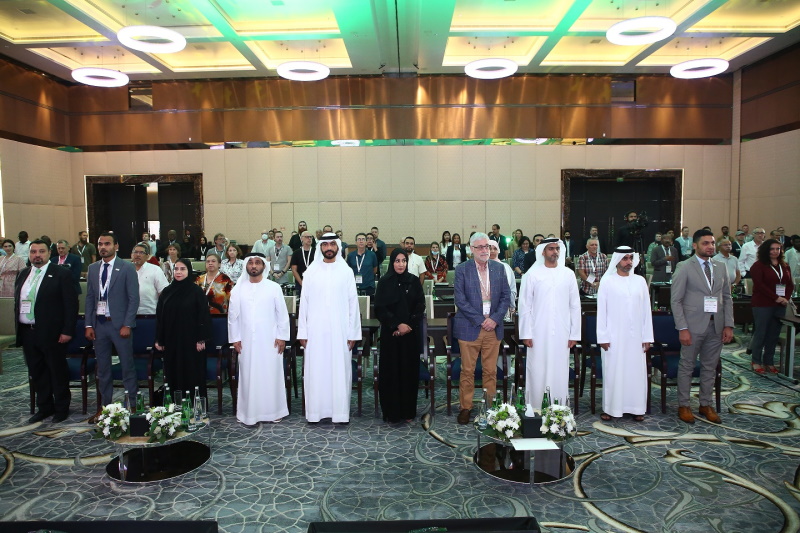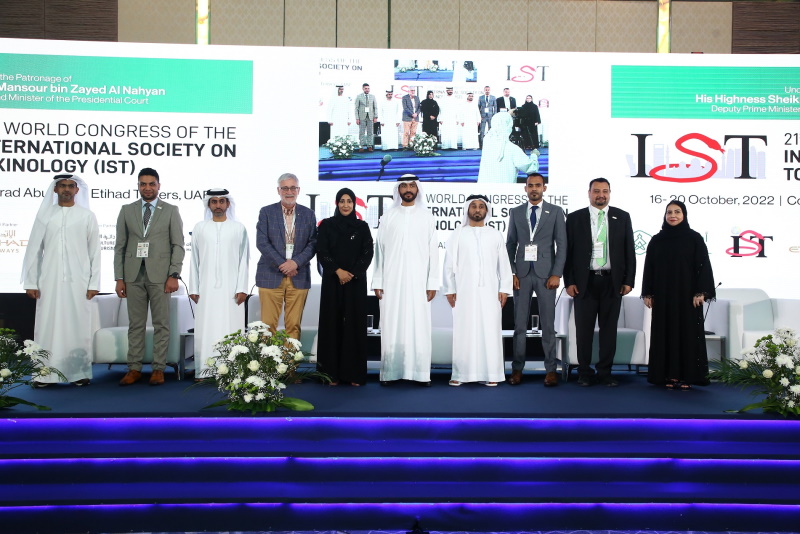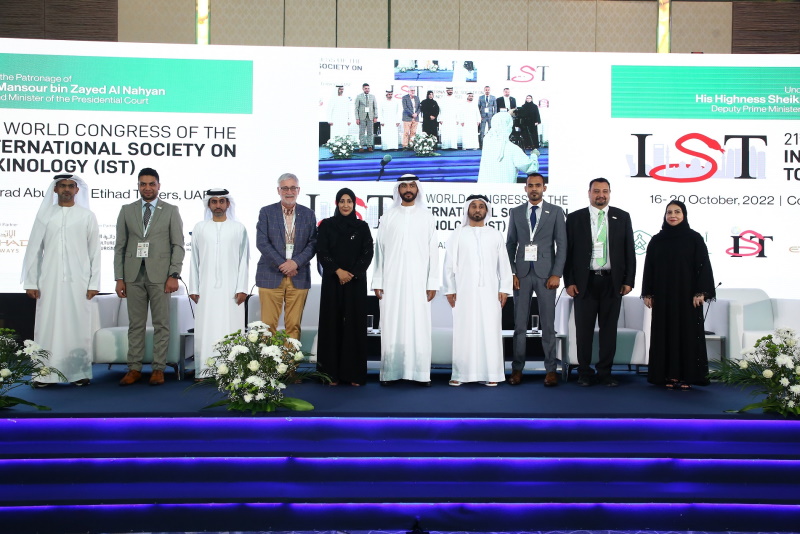
The 21st World Congress of the International Society on Toxinology (IST) starts with a large participation of elite of scientists and experts from 37 countries
Under the patronage of Sheikh Mansour Bin Zayed Al Nahyan, Deputy Prime Minister and Minister of the Presidential Court, Dr. Shaikha Salem Al Dhaheri, Secretary General of the Environment Agency - Abu Dhabi (EAD), on Monday, opened the 21st World Congress of the International Society on Toxinology (IST), in the presence of Mohammed Mousa Al Ameeri, Assistant Under-Secretary of the Food Diversity Sector at the Ministry of Climate Change and Environment.

The Congress is being organised by Amsaal, the first of its kind company in the Middle East, in collaboration with the Ministry of Climate Change and Environment, the Environment Agency - Abu Dhabi, Department of Culture and Tourism, and the Abu Dhabi Health Services Company "SEHA" at Conrad Abu Dhabi Etihad Towers. About 300 participants interested in toxinology have attended in person, while over 2,000 are participating remotely from 37 countries. Among of them 137 speakers from scientists, specialists and experts in toxicology, as well as researchers, professors of international universities, executives, and those interested in toxicology.
Opening the Congress, which is the first to be held in the Middle East, Dr. Shaikha Salem Al Dhaheri, said that the UAE has a rich biodiversity of species both animals and plants, despite its extremely arid climate, however the EAD is committed to protecting and preserving them to help maintain the balance of natural ecosystems.
“Over 25 years, a lot of information had been collected through a comprehensive biodiversity monitoring programme covering both land and marine ecosystems,” Dr. Shaikha Al Dhaheri added.
.jpg)
She continued, “This wealth of data collected has enabled us to complete an IUCN Red List of Species and we have just recently finalized the Abu Dhabi Red List of Ecosystems for the emirate.”
All wild species in the UAE are protected under the Federal Laws. Therefore, it is important that any collection of venoms or other toxins from the wild for research uses is done in accordance with the local and federal regulations in line with the international best practices, which assure their sustainability and animal welfare, Dr. Al Dhaheri added.
.jpg)
She also said, “Our ancestors managed to benefit from the different elements of biodiversity in their daily lives and managed to live in such environment, where part of its biodiversity is considered to be poisonous and toxic with the least negative possible effect of this biodiversity in their daily livelihood.”
They were able to use this biodiversity and its related traditional knowledge to get the proper cure when effected by any toxin or poison for them and for their livestock, as well as extracting the necessary treatments and medicines from them, she added.

“In the area of toxinology, a lot needs to be done in the UAE and in our region, especially to promote research and facilitate exchange of information and knowledge. In this context, the Congress is highly significant and that its outcomes will contribute to enhancing better-understanding and cooperation at the local and global levels,”Dr. Shaikha Salem Al Dhaheri said.
Commenting on hosting the 21st World Congress of the International Society on Toxinology (IST) in Abu Dhabi for the first time in the Middle East, Dr. Tarek Abd El-Aziz, Scientific Director at Amsaal, and Chair of the International Toxinology Congress, said that the large participation of specialists in the Congress confirms the prestigious international position of Abu Dhabi and its excellence in organizing major international events.
“The Congress will encompass a broad range of themes, including animal venoms, bacterial toxins, fungal toxins, plant toxins, synthesized toxins, toxin discovery and structure identification, toxin pharmacology, clinical toxinology, as the speakers from 37 countries will introduce experiences and results of their research in toxicology,” Dr. Tarek added.
The Congress is anticipated to achieve outstanding scientific results, benefiting from the great support provided by many official authorities in the UAE, and the great global presence of distinguished elite of scientists and experts from different countries of the world.
Dr. Julian White, President of the IST, said that the 21st World Congress of the International Society on Toxinology (IST) is one of the unique conferences of its kind, and it is being held for the first time in the Middle East, in Abu Dhabi, the capital of the UAE.
“The participants will discuss many important topics related to toxicology, particularly clinical toxicology, as the scientific committee was keen to develop a distinguished scientific programme for this edition, based on the successes achieved in previous ones,” Dr. White said.
He added, “We are looking forward to achieving more success through the participation of prominent scientists, specialists, researchers and university professors, to reach new and exciting results in toxicology.”
First Day Activities
On the first day of the Congress, Dr. Richard Dart-Rocky Mountain Poison and Drug Safety (RMPDS) Colorado, USA, delivered a lecture about snake antivenom. In addition, two main sessions were organized. The first, which was moderated by Dr. Julian White, President of the IST and Women’s & Children’s Hospital, North Adelaide, Australia, and Dr. David Williams-World Health Organization (WHO)-Switzerland, discussed clinical toxicology – snakebites. During the session, Dr. Sakthivel Vaiyapuri (University of Reading, UK) talked about the peripheral arterial-thrombosis following Russell’s viper bites, while Dr. Abdulrazaq G. Habib (Bayero University Kano, Nigeria) talked about the access to snakebite medical care in Northern Nigeria through a an epidemiologic & geo-spatial study.
Meanwhile, Dr. Soumyadeep Bhaumik (University of New South Wales, Australia) reviewed a qualitative study on snakebite and care during the two waves of COVID-19 in West Bengal, India. While, Dr. Abdulsalami Nasidi (Nigeria-UK EchiTAb) presented a study conducted in Nigeria and UK on the impact of climate change on snakebite and the response to mitigate its impact in Nigeria.
The second session, which was titled “Basic Toxinology - Toxins and Ion Channels”, was moderated by Dr. Alexander Sobolevsky-Columbia University, USA, and Dr. Glenn King-University of Queensland St. Lucia, Australia. The speakers were Dr. Alexander Sobolevsky, who spoke about polyamine-containing toxins and their analog, Dr. Ashlee H. Rowe (Oklahoma University, Oklahoma, USA), who spoke about structure and mechanism of scorpion venom peptide, Dr. Steve Peigneur (University of Leuven (KU Leuven), Belgium), who spoke about the functional characterization of ion channel toxins from the longest animal on Earth, and Dr. Robert Kennedy (Vestaron Corp., Kalamazoo, USA), who spoke about the commercialization of an insecticidal peptide derived from a funnel web spider for crop protection.



























